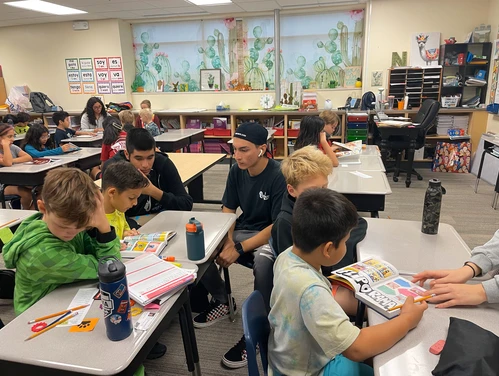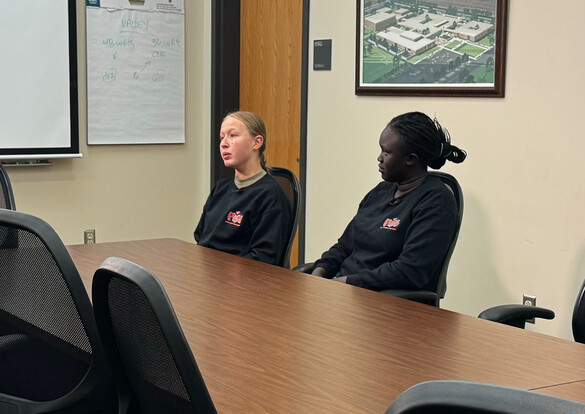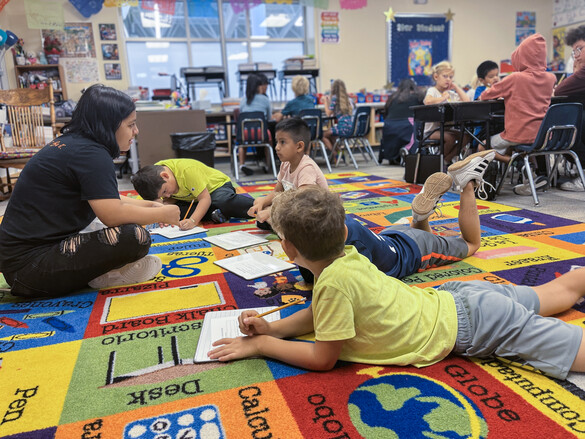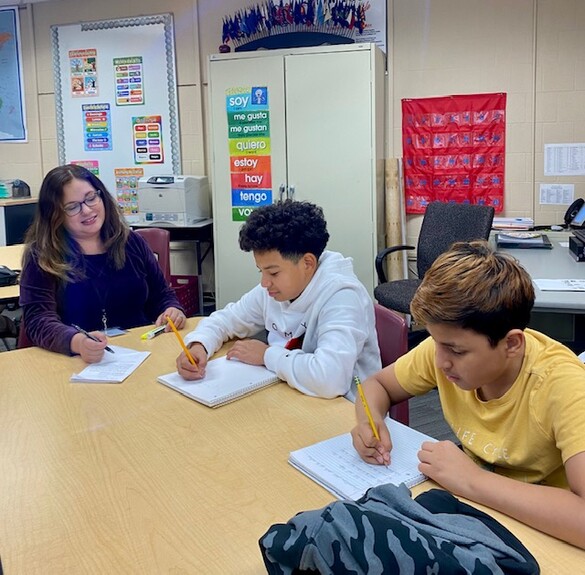Although second grade was several years ago for now 17-year-old Nyibol Chol, it remains a standout year for the West Des Moines Valley High School junior. It marked a turning point for Nyibol as she entered into an English Learner (EL) program and began her journey as a multilingual student, advocate and classroom leader.
The oldest of six siblings, Nyibol came to Iowa with her family in 2013. Her parents were originally from war-torn South Sudan and fled as refugees to Kenya, where she was born in 2007. Nyibol grew up speaking Dinka and Swahili and knew some English when she began elementary school in Iowa but realized during that impactful second grade year that she needed additional assistance.
“I hated math in elementary school and was struggling to understand what was being taught in class,” she said. “I knew basic English words and could communicate with my friends and my teacher, but I needed more help to understand my assignments and how to ask for help.”
As a result, Nyibol was identified as a student for the EL program, which helps students whose first language is not English attain English proficiency. She engaged in EL classes from second through fourth grade to strengthen her language and comprehension skills.
“It was a fun but humbling experience,” she said. “I was with other students who also needed help with English skills. It was challenging, but I know I learned so much.”
Like Nyibol, many multilingual students are taking advantage of EL classes and have become one of the fastest growing student populations in Iowa and in the U.S. Nearly 37,500 students participated in an EL program last year, representing 7 percent of the state’s total student population. Nationally, learners in EL programs represent 10 percent of all students.
“Language is what sets humans apart,” said Rachel Pettigrew, education program consultant at the Iowa Department of Education. “EL classes not only help students strengthen their ability to communicate their thoughts and learn in the classroom, they also can help change perspectives and enrich the culture within a school.”
EL program opportunities for multilingual students across the country are supported by the 1974 Supreme Court decision, Lau v. Nichols. The landmark case centered on the unequal educational opportunities for 2,900 non-English speaking students in the San Francisco Unified School District and affirmed that schools had the responsibility for making classroom instruction accessible for all students. The decision of Lau v. Nichols requires that all federally funded school districts address language barriers for students with limited English proficiency and that identical education does not mean equal education.
“Lau v. Nichols brought nationwide attention to multilingual students who are marginalized,” said Natalie French, English for Speakers of Other Languages director at West Des Moines Community School District. “It created a backbone for English learners to have access to content and language for learning. I can’t imagine what the experience was like for students before that important case.”
Celebrating its 50th anniversary, Lau v. Nichols requires all public schools to provide English learners with access to school enrollment, language assistance services and translated communication to families. Students can receive extra assistance with English until they demonstrate proficiency in the four domains of listening, speaking, reading and writing.
At West Des Moines Community School District, 27 percent of all students report having a home language that is not English. The district is committed to serving the multitude of languages and cultures at all grade levels in order to provide equitable services.
“We work collaboratively as a team to think about how we can best meet the needs of students by grade and language levels,” French said. “We have our ESOL (English for Speakers of Other Languages) team work with our general education teachers and other specialists to provide targeted instruction and assistance. We create a space for teams of teachers to come together, consider the student’s instructional package and the learning target so they can be more intentional in their work with students.”
For the 2024 Iowa Teacher of the Year and English Language Learner educator Ann Mincks, the importance of the Lau v. Nichols case and EL opportunities are a cornerstone for her role as the state’s education ambassador.
“As I was starting my Teacher of the Year journey, I was inspired that it was also the 50th anniversary of Lau v. Nichols,” Mincks said. “It is a time to celebrate and reflect on what we are doing well to serve multilingual learners and how we can continue to learn and evolve.”
Mincks’s visits to school districts and teacher preparation programs across the state have centered around the impact of EL and how Iowa is addressing the growing need for services.
“We have seen an increase in enrollment in EL, and schools and educators are working hard to continue to grow and learn with their students,” Mincks said. “Although the work is never finished, it is a proud moment to hear about the many ways districts are preparing teachers to better support multilingual students and see communities engaged in the process of advancing learning opportunities for all students.”
For Nyibol, the impact of her EL opportunities at West Des Moines has stayed with her, not only in the classroom but also as an advocate for other students. She is a leader for the Refugee and Immigrant Student Embassy, also known as RISE, which supports immigrant and refugee students who also may be English learners. The group has raised over $15,000 to provide higher education scholarships for first-generation students and has motivated Nyibol to continue moving forward.
“With EL classes, I have more confidence to be a leader and apply to college,” she said. “Before Lau v. Nichols, students could sink or swim. EL helped me feel equal to my peers, close achievement gaps and have the same opportunities.”
For more information on English learners, visit the Department’s webpage or contact Rachel Pettigrew at rachel.pettigrew@iowa.gov.



